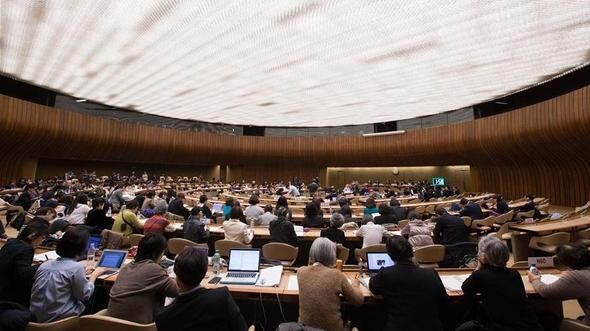hankyoreh
Links to other country sites 다른 나라 사이트 링크
UN panel says comfort women agreement not “fully victim-centered”

The United Nations Committee on the Elimination of Discrimination against Women (CEDAW) called on Japanese leaders and officials on Mar. 7 to “desist from making disparaging statements” about comfort women survivors.
The leaders and officials are currently under fire for what many see as an evasion of responsibility on the issue of women drafted into sexual slavery to the Japanese imperial military.
CEDAW’s call came as part of a statement on the results of a February review of the Japanese government.
“Japan’s leaders and officials have made several statements recently on the matter of responsibility for the comfort women issue,” the committee noted.
CEDAW, a UN women’s human rights organization consisting of around 20 experts in women’s issues, previously acknowledged the forcible mobilization of the comfort women and made calls in 1994, 2003, 2004, and 2009 for Tokyo to admit responsibility and compensate the survivors.
During last month’s CEDAW review, Deputy Minister for Foreign Affairs Shinsuke Sugiyama, who takes orders from the Prime Minister’s office, made statements denying that comfort women were mobilized by force.
“[The Japanese government] could not confirm any forcible mobilization by the military or authorities, and the claims that there were 200,000 comfort women and that they were ‘sex slaves’ are not true,” Sugiyama said at the time.
CEDAW also dismissed a Dec. 2015 agreement announced by the South Korean and Japanese foreign ministers as “finally and irreversibly” resolving the comfort women issue.
“The approach claimed as an ‘irreversible resolution to the issue’ did not represent the adoption of a victim-centered approach,” the committee said.
“In executing the agreement, the Japanese government should accept the position of the victims or survivors and guarantee truth, justice, and compensation for the victims,” it urged.
CEDAW further called on Tokyo to help the Japanese public better understand the issue by restoring deleted accounts of the comfort women in textbooks.
“Some of the comfort women survivors have died without an official acknowledgement of responsibility by the Japanese government for the serious violation of human rights they experienced, and the Japanese government has removed the comfort women issue from textbooks,” it noted.
“The Japanese government should include the comfort women issue in textbooks and guarantee that many students and members of the public know the objective, historical facts,” it recommended.
The committee also insisted on “acknowledging the victims‘ right to healing” and “providing an apology and complete and effective compensation and indemnification that the victims can be satisfied with.”
It went on to urge Tokyo to report on its measures to guarantee victim and survivor rights for the next review.
“The comfort women issue remains resolved despite the repeated recommendations of the UN Committee against Torture and various other UN human rights mechanisms,” the committee said.
“While the Japanese government may have reached an agreement recently with the South Korean government on the comfort women issue, it is unfortunate that it has not adequately implemented the UN’s various recommendations to date,” it added.
By Seong Yeon-cheol, staff reporter
Please direct questions or comments to [english@hani.co.kr]

Editorial・opinion
![[Column] Park Geun-hye déjà vu in Yoon Suk-yeol [Column] Park Geun-hye déjà vu in Yoon Suk-yeol](https://flexible.img.hani.co.kr/flexible/normal/500/300/imgdb/original/2024/0424/651713945113788.jpg) [Column] Park Geun-hye déjà vu in Yoon Suk-yeol
[Column] Park Geun-hye déjà vu in Yoon Suk-yeol![[Editorial] New weight of N. Korea’s nuclear threats makes dialogue all the more urgent [Editorial] New weight of N. Korea’s nuclear threats makes dialogue all the more urgent](https://flexible.img.hani.co.kr/flexible/normal/500/300/imgdb/original/2024/0424/7317139454662664.jpg) [Editorial] New weight of N. Korea’s nuclear threats makes dialogue all the more urgent
[Editorial] New weight of N. Korea’s nuclear threats makes dialogue all the more urgent- [Guest essay] The real reason Korea’s new right wants to dub Rhee a founding father
- [Column] ‘Choson’: Is it time we start referring to N. Korea in its own terms?
- [Editorial] Japan’s rewriting of history with Korea has gone too far
- [Column] The president’s questionable capacity for dialogue
- [Column] Are chaebol firms just pizza pies for families to divvy up as they please?
- [Column] Has Korea, too, crossed the Rubicon on China?
- [Correspondent’s column] In Japan’s alliance with US, echoes of its past alliances with UK
- [Editorial] Does Yoon think the Korean public is wrong?
Most viewed articles
- 1[Column] Park Geun-hye déjà vu in Yoon Suk-yeol
- 2Thursday to mark start of resignations by senior doctors amid standoff with government
- 3N. Korean hackers breached 10 defense contractors in South for months, police say
- 4Kim Jong-un expressed ‘satisfaction’ with nuclear counterstrike drill directed at South
- 5[Editorial] New weight of N. Korea’s nuclear threats makes dialogue all the more urgent
- 6Will NewJeans end up collateral damage in internal feud at K-pop juggernaut Hybe?
- 7[Column] ‘Choson’: Is it time we start referring to N. Korea in its own terms?
- 8[Editorial] Japan’s rewriting of history with Korea has gone too far
- 9[Cine feature] A new shift in the Korean film investment and distribution market
- 10[Column] The president’s questionable capacity for dialogue